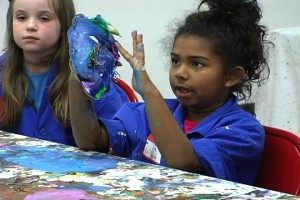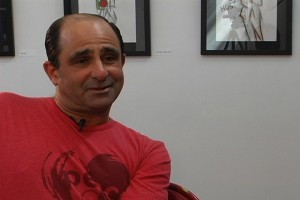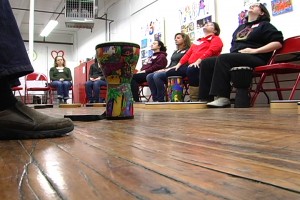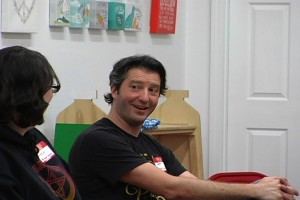 The dozen girls and boys who have gathered around a set of tables for an evening workshop don’t know it yet, but the masks they create over the next 90 minutes will help many of them work through issues they are facing: maybe problems at home, or school or with friends. And they will share their feelings of frustration, happiness or worry.
The dozen girls and boys who have gathered around a set of tables for an evening workshop don’t know it yet, but the masks they create over the next 90 minutes will help many of them work through issues they are facing: maybe problems at home, or school or with friends. And they will share their feelings of frustration, happiness or worry.
The kids are candid and the atmosphere at this studio in the heart of Pawtucket’s Hope Artiste Village is one of safety and support. It’s what you might expect at a place called PeaceLove Studios. Peace of mind, and love for yourself.
 “Our vision was when you walk in the doors here, we don’t care who you are, what you are, what you got, it doesn’t matter. We’re all people,” said Jeff Sparr, who co-founded PeaceLove in 2009 with his cousin Matt Kaplan. Their mission: To help people facing mental health issues through art. The numbers tell the story: One in four Americans has a diagnosed mental illness, but two out of three will not go for help because of a perceived stigma.
“Our vision was when you walk in the doors here, we don’t care who you are, what you are, what you got, it doesn’t matter. We’re all people,” said Jeff Sparr, who co-founded PeaceLove in 2009 with his cousin Matt Kaplan. Their mission: To help people facing mental health issues through art. The numbers tell the story: One in four Americans has a diagnosed mental illness, but two out of three will not go for help because of a perceived stigma.
Sparr knows it all firsthand. A star tennis player at Ohio State who came back to Rhode Island to run his family’s textile business, he has suffered most of his life from obsessive compulsive disorder (OCD). Desperation pushed him toward expressive art.
“Mental illness robs you of a sense of control and I was immediately attracted to the sense of control,” he said. “When I painted I was in control. I found that kind of invigorating for my soul.”
So why has mental health been such a difficult topic to talk about openly? “Very simple: invisible and misunderstood,” Sparr said. “It’s hard to fix something you can’t see and you can’t understand.”
 PeaceLove runs a variety of workshops for all ages. The mask-making workshop often fills up quickly. A 10-week after-school class has Providence public school students making transformational collages. And one night we sat in on a drumming workshop for two dozen adults. Dr. Hank Brightman, a trauma and wellness specialist, took the group through a variety of exercises using drums, transitioning into an art project that focused on purging negative thoughts and issues.
PeaceLove runs a variety of workshops for all ages. The mask-making workshop often fills up quickly. A 10-week after-school class has Providence public school students making transformational collages. And one night we sat in on a drumming workshop for two dozen adults. Dr. Hank Brightman, a trauma and wellness specialist, took the group through a variety of exercises using drums, transitioning into an art project that focused on purging negative thoughts and issues.
 “Everybody has a story or a connection to mental illness or mental health,” says Matt Kaplan, who also sat in on Dr. Brightman’s session. Kaplan focuses primarily on the business side of PeaceLove. The seeds were first planted in 2008 when he urged Sparr to sell some of his artwork.
“Everybody has a story or a connection to mental illness or mental health,” says Matt Kaplan, who also sat in on Dr. Brightman’s session. Kaplan focuses primarily on the business side of PeaceLove. The seeds were first planted in 2008 when he urged Sparr to sell some of his artwork.
“And in one night we sold about $16,000 worth of art work. At the end of the night I said, ‘Here you go buddy — $16,000. What do you want to do with it?’ And he kind of looked at me, thought about it for a few seconds and he said, ‘[When] I paint it makes me feel better, maybe it’ll help other people.'”
They founded PeaceLove, a non-profit with a twist: It also has a for-profit side that generates revenue to help fund the studio through the sale of various PeaceLove merchandise. The organization has a partnership with Alex and Ani’s Charity by Design Program, which created a peace of mind bangle. Over the last year they have sold more than 60,000, generating tens of thousands of dollars for PeaceLove.
So like any good businessmen, Kaplan and Sparr thought about branding.
“Could we build a brand to make mental illness cool?” Kaplan asked. “Not cool to have it, but cool to support it. There’s nobody wearing a positive symbol for mental health; you know the yellow bracelet, the pink ribbon project, you know red for AIDS. A lot of great causes have great brands people can buy and in buying it show their support, but mental health didn’t have that.’’
 It began with the PeaceLove symbol that Sparr painted a decade ago and which anchors the studio in Pawtucket. The financial model has allowed PeaceLove to reach a broad spectrum of people — those who can afford to pay, like schools or corporations, but many classes are offered free and open to the public.
It began with the PeaceLove symbol that Sparr painted a decade ago and which anchors the studio in Pawtucket. The financial model has allowed PeaceLove to reach a broad spectrum of people — those who can afford to pay, like schools or corporations, but many classes are offered free and open to the public.
PeaceLove is expanding and will open a new studio in Las Vegas later this spring with the help of Zappos, the online clothing and shoe stored based in Vegas. The location may be different, but the message is the same. Sparr says dealing with mental health issues is a daily battle for him and millions of others. And his message also remains the same:
“I’m not going to let it stop me,” he said. “And that’s when I’m winning. I think that’s the key to battling any affliction or illness. Not letting it define you. Not that it’s not difficult. It is.”
If you want to see the video version of this story go to www.RhodeIslandSpotlight. If you know of a person or organization who you think deserves the Spotlight, send an email to jim@RhodeIslandSpotlight.org